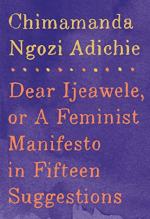
|
| Name: _________________________ | Period: ___________________ |
This test consists of 15 multiple choice questions and 5 short answer questions.
Multiple Choice Questions
1. How does Adichie feel about Sanders' advice?
(a) Adichie believes it is wise and moving.
(b) Adichie believes it will make Chizalum a better feminist.
(c) Adichie believes is will make Chizalum a better person.
(d) Adichie believes it is strong and thoughtful.
2. What is one way a new mother can approach parenting as recommended in Suggestion 1?
(a) Do listen to other Igbo mothers.
(b) Do not follow others' ways.
(c) Do not assume you know everything.
(d) Do take the advice of her husband seriously.
3. Before British Colonialism, what other activity did women do in Nigeria?
(a) Women farmed.
(b) Women taught.
(c) Women worked.
(d) Women mothered babies.
4. What is one word Adichie recommends replacing X with?
(a) Pridefulness.
(b) Anger.
(c) Silence.
(d) Abuse.
5. Why is it important that Chizalum reject gender roles from the beginning as stated in Suggestion 3?
(a) Gender roles cannot be unlearned, and Chizalum will carry them with her forever.
(b) Gender roles are insidious, and girls do not have the proper tools to decipher how dangerous they are.
(c) Gender roles are deeply conditioned, and it is difficult to unlearn them.
(d) Gender roles are all over in the media, and girls are easily swayed to believe what they see.
6. Toward the middle of Suggestion 1, Adichie identifies what trait as being important to motherhood?
(a) Always reaching for perfectionism.
(b) Parenting equally with a partner.
(c) Giving oneself room to fail.
(d) Being active in instilling feministic notions at an early age.
7. What does Adichie recommend in Suggestion 6 for Ijeawele to do in order to teach Chizalum about language?
(a) Chizalum will have to learn both her native language and English.
(b) Chizalum will have to listen to others' language more than her own.
(c) Chizalum will have to study language and each word's various meanings.
(d) Chizalum will need to question her own language first.
8. If a husband is not a headmaster according to Adichie, what is a wife not?
(a) A student.
(b) A maid.
(c) A schoolgirl.
(d) A mother.
9. What does Adichie propose Ijeawele teach her daughter to overcome all the issues presented in Suggestion 3?
(a) Adichie says to teach Chizalum to research feminism and use its tools to better her own life.
(b) Adichie says to teach Chizalum the difference between gender inequality and sexism.
(c) Adichie says to teach Chizalum how to stand up for herself and teach others about inequality.
(d) Adichie says to teach Chizalum self-reliance, that it is important for her to have independence.
10. What differs for Adichie when she is asked about sexism as opposed to racism according to Suggestion 4?
(a) Adichie responds in the same manner, because they are both injustices.
(b) Adichie tells people that racism is more deep-seeded, because it has been around longer; sexism is secondary.
(c) Adichie refuses to speak about racism, because sexism is more important.
(d) Adichie has to prove her reasoning for sexism while racism does not have the same expectation.
11. How does Adichie initially feel about her friend's request for advice?
(a) Adichie feels that it is too difficult to explain.
(b) Adichie feels that it is too huge of a task.
(c) Adichie feels that she is the best person to ask.
(d) Adichie feels that her friend should already know the answer.
12. What charge does Adichie take seriously according to her Letter?
(a) How to raise a strong woman.
(b) How to raise a feminist.
(c) How to raise a religious woman.
(d) How to raise an independent thinker.
13. How does Adichie define the first premise of feminism at the start of her Letter?
(a) The solid independent belief that needs a particular calling.
(b) The solid feeling that women need equality.
(c) The solid bending belief that is malleable and important.
(d) The solid unbending belief that you start off with.
14. As stated in the Introduction, how long ago did the author, Adichie, receive a request her for advice?
(a) 1 year ago.
(b) 2 years ago.
(c) 5 years ago.
(d) 10 years ago.
15. What is Suggestion 1?
(a) Being a mother is the most important part of being a feminist.
(b) Motherhood is a glorious experience.
(c) Define yourself by motherhood.
(d) Be a full person.
Short Answer Questions
1. What is the magnificent thing that Ijeawele has done at the start of the letter?
2. What should Ijeawele do if Chizalum will not read, according to Adichie?
3. What is the global-middle class phenomenon of "parenting" in accordance with Suggestion 1?
4. At the end of Suggestion 2, praise for fathers it put into question. Why does Adichie believe this is an important concept to be analyzed?
5. How will Ijeawele know that child-care work is being equally shared?
|
This section contains 926 words (approx. 4 pages at 300 words per page) |

|




